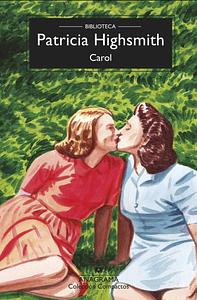Take a photo of a barcode or cover
reflective
slow-paced
SO FREAKING BEAUTIFUL!!! Better than the movie. It made me cry ❤️ I may reread something for once in my life
emotional
sad
medium-paced
Plot or Character Driven:
Character
medium-paced
Plot or Character Driven:
A mix
Strong character development:
Yes
Loveable characters:
Yes
I've loved the movie for years and now I can say I LOVE this book.
3 hours in and I am completely bored, can't do it any longer.
Spesso sono proprio i libri il cui fulcro è una storia d'amore a non avere una storia d'amore convincente. Cos'è, mi chiedo, che rende una storia d'amore convincente e appassionante? Come fa un autore a farmi credere che questi due personaggi si sono innamorati e non stanno insieme solo perché sì?
The Price of Salt non mi ha dato una risposta a questa domanda. O meglio, non mi ha colpito tanto per la storia d'amore quanto per i personaggi: con uno stile di scrittura trasparente, Patricia Highsmith racconta di Therese e di Carol — di Therese, ossessionata da una donna più grande che mette subito in ombra il fidanzato, e di Carol, in mezzo a un divorzio reso aspro dal marito per la custodia della figlia.
È impossibile non restare ammaliati da Carol. Ho trovato invece irritante la Therese iniziale, il che per contrasto ha reso interessante il suo sviluppo e la presa di coscienza del proprio orientamento sessuale.
Tra quando ho finito il libro e questa recensione è passato quasi un mese e mezzo e nel frattempo ho visto anche il film. Il film, tagliando passaggi e marginalizzando personaggi, è servito a ricordarmi quanto fosse più ricco ed emozionante il libro, in particolare nell'ultima parte.
The Price of Salt non mi ha dato una risposta a questa domanda. O meglio, non mi ha colpito tanto per la storia d'amore quanto per i personaggi: con uno stile di scrittura trasparente, Patricia Highsmith racconta di Therese e di Carol — di Therese, ossessionata da una donna più grande che mette subito in ombra il fidanzato, e di Carol, in mezzo a un divorzio reso aspro dal marito per la custodia della figlia.
È impossibile non restare ammaliati da Carol. Ho trovato invece irritante la Therese iniziale, il che per contrasto ha reso interessante il suo sviluppo e la presa di coscienza del proprio orientamento sessuale.
Tra quando ho finito il libro e questa recensione è passato quasi un mese e mezzo e nel frattempo ho visto anche il film. Il film, tagliando passaggi e marginalizzando personaggi, è servito a ricordarmi quanto fosse più ricco ed emozionante il libro, in particolare nell'ultima parte.
emotional
hopeful
reflective
slow-paced
Plot or Character Driven:
Character
Strong character development:
Yes
Loveable characters:
Complicated
Diverse cast of characters:
No
Flaws of characters a main focus:
Complicated
dark
emotional
sad
slow-paced
Plot or Character Driven:
Character
Claire Morgan is a pseudonym for Patricia Highsmith. She didn't want her name to be associated with this book that was ahead of its time (1952) for portraying a lesbian love story that actually has a (mostly) happy ending.
Therese Belivet is an aspiring stage designer living in NYC and who is working a temp job at a department store when she meets a woman named Carol who comes in as a customer. The two are very different but soon become friends, as Therese provides companionship during Carol's acrimonious divorce. Love blooms as they go on a road trip, but Carol's husband is threatening to take their daughter, Rindy, away from Carol unless she stops seeing Therese.
I thought this book was very lovely. Morgan (Highsmith) has wonderful descriptive powers, and great insight into the human heart.
My one criticism is that while Carol is a fully-realized human being with complications and flaws, Therese is a little vague and undeveloped, though she does grow up a bit over the course of the book. Overall, though, I loved this and didn't want it to end. Recommended.
Therese Belivet is an aspiring stage designer living in NYC and who is working a temp job at a department store when she meets a woman named Carol who comes in as a customer. The two are very different but soon become friends, as Therese provides companionship during Carol's acrimonious divorce. Love blooms as they go on a road trip, but Carol's husband is threatening to take their daughter, Rindy, away from Carol unless she stops seeing Therese.
I thought this book was very lovely. Morgan (Highsmith) has wonderful descriptive powers, and great insight into the human heart.
My one criticism is that while Carol is a fully-realized human being with complications and flaws, Therese is a little vague and undeveloped, though she does grow up a bit over the course of the book. Overall, though, I loved this and didn't want it to end. Recommended.
While I have watched a few film adaptations of Patricia Highsmith's novels I have never read any, until "Carol" (previously titled "The Price of Salt"). I'm not sure why I started with this one. Maybe because it has a somewhat happy ending, unusual for the author.
I was transfixed. All through my reading of this novel, I couldn't shake the feelings of a lingering sadness, an unfulfilled, restless desire. So much left unsaid, and so many characters only briefly realized, and yet I find I cannot stop thinking about it.
The crux of it all is that I am aware the author is regarded as a terrible human being. I do plan on reading some of her biographies, soon, and wonder how I'll feel about Highsmith's works after better understanding the author's misanthropic views, to put it lightly.
I was transfixed. All through my reading of this novel, I couldn't shake the feelings of a lingering sadness, an unfulfilled, restless desire. So much left unsaid, and so many characters only briefly realized, and yet I find I cannot stop thinking about it.
The crux of it all is that I am aware the author is regarded as a terrible human being. I do plan on reading some of her biographies, soon, and wonder how I'll feel about Highsmith's works after better understanding the author's misanthropic views, to put it lightly.




